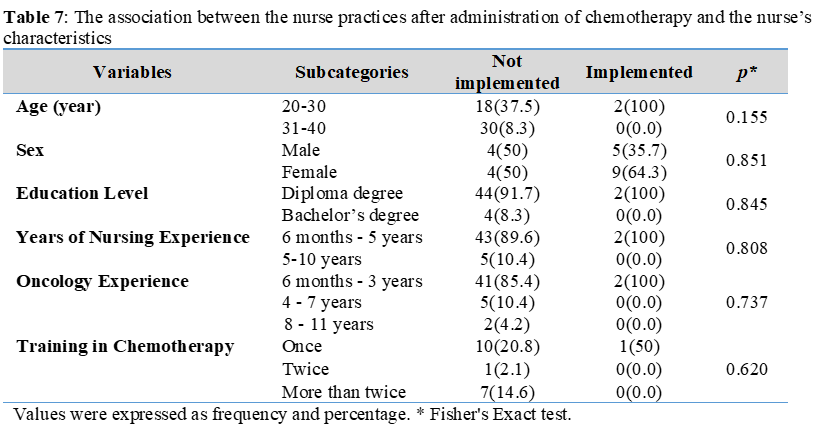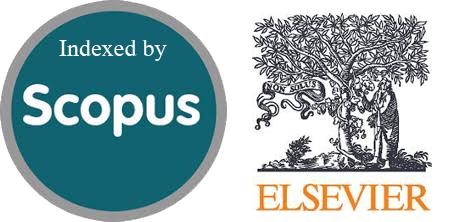Impact of Clinical Pharmacist-Led Educational Intervention on Nursing Practice of Intravenous Chemotherapy Administration: A Quasi-Experimental Design
DOI:
https://doi.org/10.54133/ajms.v9i1.2277Keywords:
Cancer chemotherapy, Clinical pharmacist-led intervention, Intravenous administration, Nurses, PracticeAbstract
Background: Intravenous chemotherapy administration is a procedure with considerable risk, inherently associated with the potential for substantial medication errors. Nurses play a pivotal role in this procedure, and having sufficient knowledge and practice is vital for ensuring patient safety. Objective: To evaluate the impact of clinical pharmacists' educational interventions regarding intravenous chemotherapy administration practice. Methods: A quasi-experimental, pre-post-test study was conducted at Kirkuk Oncology and Hematology Center and Oncology Teaching Hospital in Baghdad. A convenience sample of 50 nurses responsible for intravenous chemotherapy administration participated. The intervention consisted of educational sessions by a clinical pharmacist, covering essential aspects of safe intravenous chemotherapy administration. The baseline knowledge evaluation was done using a self-administered questionnaire, followed by the educational intervention, and then the practice evaluation phase. Results: Before chemotherapy, nurses failed to follow the recommended practices in 79% of observed instances (2,605 out of 3,300). This indicates a significant lack of adherence to the 22 pre-chemotherapy checklist items. Conversely, nurses were highly compliant with procedures during chemotherapy administration, with only 10.67% failing to follow proper protocol. After chemotherapy, the rate of non-compliance was extremely high. Nurses did not follow the proper procedures in most observed opportunities, with a non-compliance rate of 99.89%. This trend was observed across the 12 post-chemotherapy practice items. There was no significant association between nurse characteristics and practices after the administration of chemotherapy. Conclusions: Clinical pharmacists' educational interventions can enhance nurses' knowledge and practice in administering intravenous chemotherapy.
Downloads
References
Abbas Z, Rehman S. An overview of cancer treatment modalities. Neoplasm. 2018;1: pp.140-157. doi: 10.5772/intechopen.76558. DOI: https://doi.org/10.5772/intechopen.76558
Sreekumaran J, Goyal H, Sharma R, Javeth A. Educational intervention program regarding safe administration of chemotherapy: A quasiexperimental study among nursing personnel in a tertiary care hospital. J Edu Health Promot. 2025;14(1):130. doi: 10.4103/jehp.jehp_898_24. DOI: https://doi.org/10.4103/jehp.jehp_898_24
Cronenwett LR, Bootman JL, Wolcott J, Aspden P, (Eds.), Preventing Medication Errors: National Academies Press; 2007.pp. 409-46 .doi: 10.17226/11623. DOI: https://doi.org/10.17226/11623
Mamdouh Zakaria M, Mohamed Alaa S, Mohamed Desoky G. Oncology nurses' knowledge and practices regarding safe administration of intravenous chemotherapy. Egypt J Health Care. 2022;13(1):1218-1231. doi: 10.21608/ejhc.2022.225111. DOI: https://doi.org/10.21608/ejhc.2022.225111
Cicolini G, Simonetti V, Comparcini D, Labeau S, Blot S, Pelusi G, et al. Nurses' knowledge of evidence‐based guidelines on the prevention of peripheral venous catheter‐related infections: a multicentre survey. J Clin Nurs. 2014;23(17-18):2578-2588. doi: 10.1111/jocn.12474. DOI: https://doi.org/10.1111/jocn.12474
Kapucu S, Özkaraman AO, Uysal N, Bagcivan G, Şeref FC, Elöz A. Knowledge level on administration of chemotherapy through peripheral and central venous catheter among oncology nurses. Asia-Pac J Oncol Nurs. 2017;4(1):61-68. doi: 10.4103/2347-5625.199081. DOI: https://doi.org/10.4103/2347-5625.199081
Antúnez-Blancat A, Gago-Valiente FJ, García-Iglesias JJ, Merino-Navarro D. The role of nursing in the management of chemotherapy extravasation: A systematic review regarding public health. Healthcare (Basel). 2024;12(14):1456. doi: 10.3390/healthcare12141456. DOI: https://doi.org/10.3390/healthcare12141456
Moukafih B, Abahssain H, Mrabti H, Errihani H, Rahali Y, Taoufik J, et al. Impact of clinical pharmacy services in a hematology/oncology ward in Morocco. J Oncol Pharm Pract. 2021;27(2):305-311. doi: 10.1177/1078155220919169. DOI: https://doi.org/10.1177/1078155220919169
Leveque D, Delpeuch A, Gourieux B. New anticancer agents: role of clinical pharmacy services. Anticancer Res. 2014;34(4):1573-1578. PMID: 24692684.
Lin Q, Wang GS, Ma G, Shen Q. The role of pharmaceutical care in the oncology department. Eur J Hosp Pharm. 2015;22(3):128-131. DOI: https://doi.org/10.1136/ejhpharm-2014-000591
Fadhil I, Hassan H. Evaluation of nurses’ practices toward safe intravenous chemotherapy infusion in Baghdad City hospitals. Iraqi Natl J Nurs Specialties. 2018;31(2):43-56. doi: 10.58897/injns.v31i2.306. DOI: https://doi.org/10.58897/injns.v31i2.306
Winn A, Afolabi EK, Bifarin M, Avwioro T, Alatise OI, Kingham PT, et al. Knowledge, attitudes, and practice of chemotherapy management among nurses at Obafemi Awolowo University Teaching Hospital, Ile-Ife, Nigeria. Asia-Pac J Oncol Nurs. 2024;11(3):100371. doi: 10.1016/j.apjon.2023.100371. DOI: https://doi.org/10.1016/j.apjon.2023.100371
Al-Attar W, Al-Gannem M. Effectiveness of the nursing educational program upon nurse’s knowledge and practices concerning chemotherapy precautions. IOSR J Nurs Health Sci. 2015;4(6):7-13. doi: 10.9790/1959-04630713.
Alaraidh S, Alnaim LS, Almazrou SH. Impact of educational intervention on compliance of health care workers towards chemotherapy handling guidelines. J Multidisciplin Healthcare. 2023:3035-3042. doi: 10.2147/JMDH.S426931. DOI: https://doi.org/10.2147/JMDH.S426931
Sargidy AAW, Yahia A, Ahmad M, Abdalla A, Khalil SN, Alasiry S, et al. Knowledge of safe handling, administration, and waste management of chemotherapeutic drugs among oncology nurses working at Khartoum Oncology Hospital, Sudan. PeerJ. 2022;10:e14173. doi: 10.7717/peerj.14173. DOI: https://doi.org/10.7717/peerj.14173
Abdullah DAH, Rasheed OH. Nursing staff knowledge regarding safe chemotherapy administration at oncology center in Kirkuk City. Kirkuk Univ J. 2018;13(1):144-155. doi: 10.32894/kujss.2018.142401. DOI: https://doi.org/10.32894/kujss.2018.142401
Bloom BS. Learning for mastery. Instruction and curriculum. Regional education laboratory for the Carolinas and Virginia, topical papers and reprints, Number 1. Evaluation Comment. 1968;1(2):n2.
Susheela F, Goruntla N, Bhupalam PK, Veerabhadrappa K, Sahithi B, Ishrar S. Assessment of knowledge, attitude, and practice toward responsible self-medication among students of pharmacy colleges located in Anantapur district, Andhra Pradesh, India. J Edu Health Promot. 2018;7(1):96. doi: 10.4103/jehp.jehp_175_17. DOI: https://doi.org/10.4103/jehp.jehp_175_17
Alzahrani MM, Alghamdi AA, Alghamdi SA, Alotaibi RK. Knowledge and attitude of dentists towards obstructive sleep apnea. Int Dent J. 2022;72(3):315-321. doi: 10.1016/j.identj.2021.05.004. DOI: https://doi.org/10.1016/j.identj.2021.05.004
Salah M, Zaitoun Y, Fakhry B, Karayni M, Mokashar A, Chahine C, et al. Knowledge, attitude, and practices concerning prostate cancer and its prevention in the Lebanese population. Sci Rep. 2024;14(1):28551. doi: 10.1038/s41598-024-64584-6. DOI: https://doi.org/10.1038/s41598-024-64584-6
Cancer Institute NSW. Anti-cancer drug administration course (ADAC) [Internet]. Sydney (AU): Cancer Institute NSW; [cited 2025 Aug 11]. Available from: https://education.eviq.org.au/courses/anti-cancer-drug-administration-course-adac/anti-cancer-drug-administration-course
Armitage G, Knapman H. Adverse events in drug administration: a literature review. J Nurs Manag. 2003;11(2):130-140. doi: 10.1046/j.1365-2834.2003.00359.x. DOI: https://doi.org/10.1046/j.1365-2834.2003.00359.x
Oti NOO, de Villiers M, Adejumo P, Okumu R, Maliti B, Elkateb N, et al. Strengthening of oncology nursing education and training in Africa in the year of the nurse and midwife: addressing the challenges to improve cancer control in Africa. Ecancermedicalscience. 2021;15:1209. doi: 10.3332/ecancer.2021.1209. DOI: https://doi.org/10.3332/ecancer.2021.1209
Martin S, Larson E. Chemotherapy-handling practices of outpatient and office-based oncology nurses. Oncol Nurs Forum. 2003;30(4):575-581. doi: 10.1188/03.ONF.575-581. DOI: https://doi.org/10.1188/03.ONF.575-581
Ibrahim NA, Rabe'a MA. Impact of instructional intervention program upon women's psychological health status who undergo chemotherapy after mastectomy. Iraqi Natl J Nurs Specialties. 2012;25(3). doi: 10.58897/injns.v25i3. DOI: https://doi.org/10.58897/injns.v25i3.147
Mohammed A, Aburaghif L. Effectiveness of teaching program on nurses' knowledge concerning the side effects of chemotherapy among children with leukemia at oncology wards in Baghdad City. Iraqi Natl J Nurs Specialties. 2018;31(1):14–23. doi: 10.58897/injns.v31i1.288. DOI: https://doi.org/10.58897/injns.v31i1.288

Downloads
Published
How to Cite
Issue
Section
License
Copyright (c) 2025 Al-Rafidain Journal of Medical Sciences ( ISSN 2789-3219 )

This work is licensed under a Creative Commons Attribution-NonCommercial-ShareAlike 4.0 International License.
Published by Al-Rafidain University College. This is an open access journal issued under the CC BY-NC-SA 4.0 license (https://creativecommons.org/licenses/by-nc-sa/4.0/).











